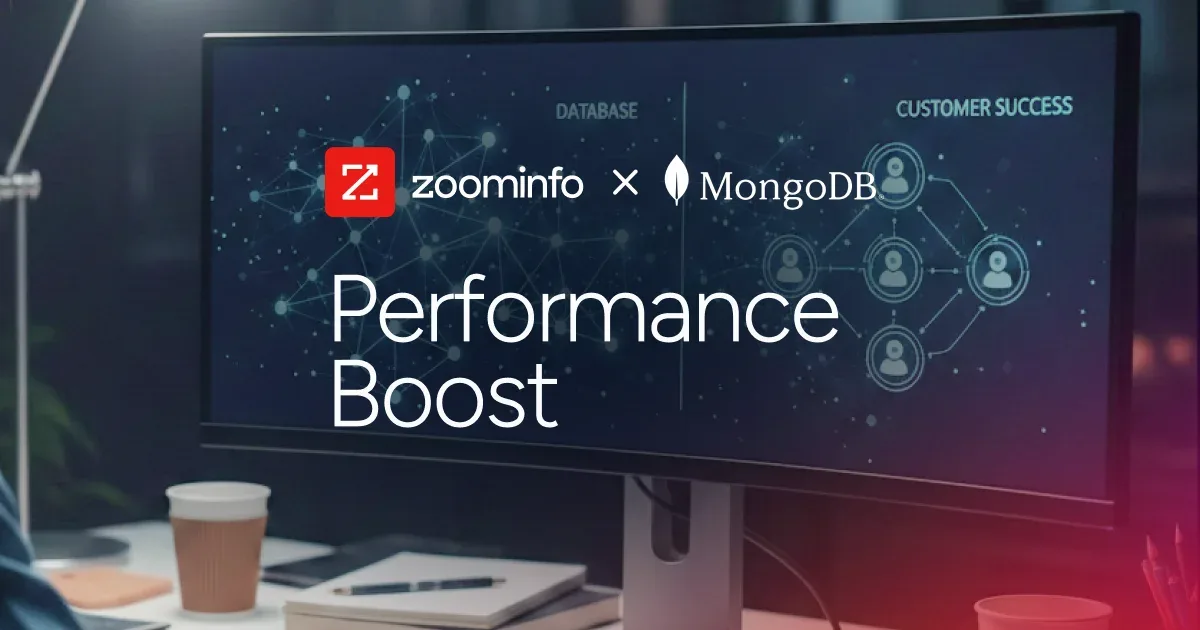Challenge
MongoDB’s sales leaders and reps are avid users of Chorus — but they weren’t the first at the company to make the conversation intelligence platform part of their daily workflow. That was the customer success team, says Sean Andrew, Senior Vice President, Worldwide Corporate Sales, at MongoDB. “Customer success started using Chorus a few years ago for training and enablement, and I initially learned about the solution and its benefits from them,” he recalls.
After a pilot project with Chorus, Andrew says he concluded that the platform would be a highly effective way for the corporate sales team to share best practices and accelerate the ramp time and productivity of new reps. “The call recordings in Chorus would also allow our sales leaders to provide robust coaching to reps without the need to be present on every call,” Andrew says.
“With Chorus by ZoomInfo, we can be confident that we are getting accurate and reliable information from sales. We know exactly why a customer purchased, what the use case is, and how that customer wants to be successful. And then, we can take all that information and help ensure the customer is successful.”
Taylor Francis
Customer Success Manager, MongoDB
Solution
Call recordings in Chorus are critically important to the customer success team’s development, as well, because they help them to deepen their own knowledge of MongoDB’s technology — and why customers need the platform, and how they use it. Taylor Francis, a Customer Success Manager at MongoDB, who works primarily with enterprise customers in Texas and Northern California, says, “One of the best ways to learn about MongoDB is to understand it from the customer’s point of view. So, one of my favorite ways to use Chorus is for customer call reviews.”
According to Francis, the customer success and sales organizations at MongoDB both use Chorus regularly to build playlists that their team members can use to help further their knowledge and development. “We have a global meeting each week where we talk about recent wins,” she explains. “For example, maybe someone had a demo that went really well, and that led to some discovery. Anything that resulted in something positive for the customer, we’ll share it internally and preserve it in a playlist.”
Francis says another benefit of having the ability to record calls in Chorus and review them later is that it allows her to “really focus on and think critically about what customers are saying” during calls instead of worrying about writing down detailed notes. “We work in databases, so there are a lot of numbers and technical information being thrown around,” Francis says. “It’s critical to understand the numbers, but I don’t want to waste time asking customers to repeat things. So, it’s great knowing that everything said during calls is documented for me in Chorus. I can focus on strategy when I’m talking to customers. If I have an action item, I can just listen to the call later and pick up the details.”
One area where Chorus has been a game-changer, according to Francis, is during the handoff from sales to customer success. “The handoff is one of the trickiest parts of the entire sales cycle,” says Francis. “With Chorus, we can be confident that we are getting accurate and reliable information from sales. We know exactly why a customer purchased, what the use case is, and how that customer wants to be successful. And then, we can take all that information and help ensure the customer is successful.”
Francis adds, “Also, because the customer success team can listen to the pre-sales calls in Chorus and hear the voice of the customer for ourselves, we don’t have to lean on the sales team as much for details. That, in turn, allows us to give valuable time back to our salespeople. Our customers can also be more confident that they have a strong team within MongoDB supporting them.”
“It’s incredibly valuable that we can share calls in Chorus with our customer success team when we are handing off a deal to them,” says Danielle Lemieux, Senior Corporate Account Executive at MongoDB. “Chorus provides a great way to give customer success a good depth of background about why a customer chose MongoDB, what that customer expects from us next, and much more.”
The Results
Andrew says Chorus is also driving collaboration and enabling faster problem-solving throughout MongoDB’s ecosystem. “Some of our customers have very specific technical challenges,” he explains. “If a challenge comes up on a call, the rep can take that snippet and share it with our support team, as well as with customer success and engineering. We can then get real-time feedback on how to potentially address that challenge, either with a patch or a future release or some other form of innovation.”
Andrew shares a recent example of this type of problem-solving in action: “We had a customer who told us they were experiencing some challenges throughout a proof-of-concept we were carrying out with them. We took that part of the Chorus call and shared it in our ecosystem. Our cloud management and engineering teams, along with the customer success team, came up with a plan very quickly to resolve the challenges that the customer was encountering and effect a positive outcome.”
He adds, “With Chorus, we can get ahead of an issue and show great engagement with the customer, which can also help us to keep that customer longer.”
Higher customer engagement and retention aren’t the only positive outcomes that MongoDB is experiencing through its use of the Chorus platform. Product innovation is another result, as Randy Petkoff, Cloud Sales Manager at MongoDB, explains: “We had a customer who wasn’t satisfied with the service he’d received. We took the call snippet from Chorus and shared it at the highest levels of the company. Not only were we able to turn that customer around, but out of that dialogue, we also came up with some new product offerings.”



